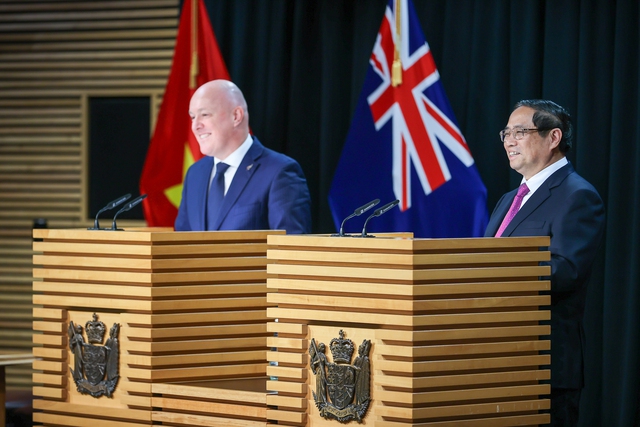Viet Nam, New Zealand plan to cooperate in achieving net-zero emissions by 2050
VGP – Viet Nam and New Zealand will develop a cooperation plan to realize their commitments to net-zero emissions by 2050, said New Zealander Prime Minister Christopher Luxon.

The joint press briefing between Vietnamese Prime Minister Pham Minh Chinh and his New Zealander Prime Minister Christopher Luxon counterpart, Wellington, March 11, 2024 - Photo: VGP/Nhat Bac
Luxon made the above statement during his joint press briefing with Vietnamese Prime Minister Pham Minh Chinh in Wellington on Monday morning.
New Zealand will continue investments in agriculture and environmental protection in Viet Nam, Luxon told reporters.
Both countries set goal to raise the two-way trade value to US$2 billion by the end of this year, he added.
As both sides will celebrate the 50th founding anniversary of diplomatic ties in 2025, Prime Minister Luxon said his Government will carry out plans to tighten friendship and cooperation with Viet Nam in order to further elevate the strategic partnership between the two countries to a new height.
Prime Minister Pham who is on a two-day official visit to New Zealand said during their summit meeting earlier the same day, he and Luxon comprehensively reviewed areas of cooperation and charted major orientations to further deepen the strategic partnership between Viet Nam and New Zealand in the coming time.
The two countries will work together to consolidate political trust, strategic trust, and political and diplomacy cooperation in order to form a more solid foundation for the bilateral ties through enhancing the exchange of delegations and contacts at all levels and effectively utilizing the existing cooperation mechanisms, including regular contact between the two Prime Ministers.
Both sides will strengthen and expand cooperation across major pillars of theirr strategic partnership, including economy-trade-investment, security and defense, agriculture, culture and people-to-people exchanges, and local-to-local linkages.
Pham expected that the two countries will achieve breakthroughs in science and technology, innovation, startup, green economy, digital economy, circular economy, environmentally friendly technology transfer, emission reduction, agriculture, and in new fronts such as artifical intelligence and semiconductor.
At their summit meeting, both sides also compared notes on regional and international issues of shared concern, and agreed to coordinate closely and support each other, particularly at the United Nations, ASEAN-led forums, and Asia-Europe Meeting (APEC).
The two sides pledged to enhance mutually beneficial dialogue and cooperation, work together to effectivel handle common challenges in the region, collaborate in advancing cooperation in Mekong sub-region.
Both sides reaffirmed the importance of ensuring peace, stability, security, safety and freedom of navigation and aviation in the East Sea; avoiding the use or threat of force; settling disputes through peaceful measures on the basis of respect for international law, especiall the 1982 United Nations Convention on the Law of the Sea.
The two countries reached high consensus on strengthening information exchange and sharing and maritime cooperation to make the East Sea a sea of peace, stability, friendship, cooperation and sustianable development./.

